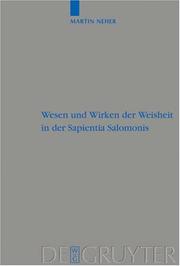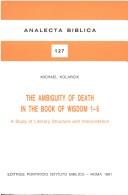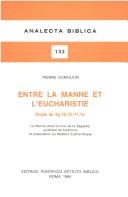| Listing 1 - 10 of 32 | << page >> |
Sort by
|
Book
ISBN: 3110555921 3110556553 Year: 2020 Publisher: Berlin ; Boston : De Gruyter,
Abstract | Keywords | Export | Availability | Bookmark
 Loading...
Loading...Choose an application
- Reference Manager
- EndNote
- RefWorks (Direct export to RefWorks)
The study spotlights the importance of ethical discourse on icons in the Book of Wisdom. Using structural, semantic, and topological analyses, it shows that parenesis about false and true images of God is an overarching theme, and contextualizes it in terms of tradition and cultural history. The text makes a unique contribution to the ancient debate on images by positing that they fulfill the imago dei invested in human beings. Trotz des anhaltenden Interesses an der Sapientia Salomonis besteht hinsichtlich der inhaltlichen und gattunggeschichtlichen Gesamteinordnung der jüdisch-hellenistischen Schrift noch immer Dissens. Die Heterogenität der verwendeten Themen, Traditionen und Genres scheint diese zu unterbinden, bleiben doch die Studien bei Teilkomplexen oder bei der literarkritischen Feststellung der Uneinheitlichkeit des Textes stehen. Auch die zuletzt vermehrt zugeschriebene strukturelle Kohärenz führte bisher nicht zu einer entsprechenden inhaltlichen Gesamtdeutung der Schrift. Gestützt auf strukturelle, semantische und topologische Analysen wird in dieser Studie die Paränese hinsichtlich wahrer und falscher Gottesbildern als Leitmotiv bzw. Hauptthema der überlieferten Endkomposition aufgezeigt. Weitere bildtheoretische, traditions- sowie kulurgeschichtliche Kontextualisierungen explizieren die Spezifika der ethisch ikonischen Ausführungen. Mit dem Postulat der Verwirklichung des im Menschen angelegten Ebenbilds durch ethische Nachahmung Gottes bietet die Schrift letzlich nicht nur einen spezifisch jüdischen Beitrag zur antiken Bilderdebatte, ihr kommt zudem eine Brückenfunktion zwischen biblischen und späteren Imago-Dei-Konzeptionen zu.
Book of Wisdom. --- Buch der Weisheit. --- Imago Dei. --- Sapientia Salomonis. --- Weisheit Salomos. --- Wisdom of Solomon. --- Bible. --- Criticism, interpretation, etc.
Book
Year: 1969 Publisher: Paris : J. Gabalda,
Abstract | Keywords | Export | Availability | Bookmark
 Loading...
Loading...Choose an application
- Reference Manager
- EndNote
- RefWorks (Direct export to RefWorks)
Book
ISBN: 3110348039 3110384647 Year: 2015 Publisher: Berlin, [Germany] ; Boston, [Massachusetts] : De Gruyter,
Abstract | Keywords | Export | Availability | Bookmark
 Loading...
Loading...Choose an application
- Reference Manager
- EndNote
- RefWorks (Direct export to RefWorks)
This study proposes that both constitutively and rhetorically (through ironic, inferential, and indirect application), Ps 106(105) serves as the substructure for Paul's argumentation in Rom 1:18-2:11. Constitutively, Rom 1:18-32 hinges on the triadic interplay between "they (ex)changed" and "God gave them over," an interplay that creates a sin-retribution sequence with an a-ba-ba-b pattern. Both elements of this pattern derive from Ps 106(105):20, 41a respectively. Rhetorically, Paul ironically applies the psalmic language of idolatrous "(ex)change" and God's subsequent "giving-over" to Gentiles. Aiding this ironic application is that Paul has cast his argument in the mold of Hellenistic Jewish polemic against Gentile idolatry and immorality, similar to Wis 13-15. In Rom 2:1-4, however, Paul inferentially incorporates a hypocritical Jewish interlocutor into the preceding sequence through the charge of doing the "same," a charge that recalls Israel's sins recounted in Ps 106(105). This incorporation then gives way to an indirect application of Ps 106(105):23, by means of an allusion to Deut 9-10 in Rom 2:5-11. Secondarily, this study suggests that Paul's argumentation exploits an intra-Jewish debate in which evocations of the golden calf figured prominently.
Golden calf (Bible) --- Golden calf (Bible). --- Idolatry --- Biblical teaching. --- Bible. --- Bible. --- Criticism, interpretation, etc. --- Criticim, interpretation, etc. --- Golden Calf. --- Psalm 106. --- Romans. --- Wisdom of Solomon.
Book
ISBN: 128199328X 9786611993283 3110209772 9783110209778 9783110209761 3110209764 Year: 2008 Publisher: Berlin New York Walter de Gruyter
Abstract | Keywords | Export | Availability | Bookmark
 Loading...
Loading...Choose an application
- Reference Manager
- EndNote
- RefWorks (Direct export to RefWorks)
While scholars have often found value in comparing Wisdom and Romans, a comparison of the use of personification in these works has not yet been made, despite the striking parallels between them. Furthermore, while scholars have studied many of these personifications in detail, no one has investigated an individual personification with respect to the general use of the trope in the work. Instead, most of this research focuses on a personification in relation to its nature as either a rhetorical device or a supernatural power. The "Powers" of Personification seeks to push beyond this debate by evaluating the evidence in a different light - that of its purpose within the overall use of personification in the respective work and in comparison with another piece of contemporaneous theological literature. This book proposes that the authors of Wisdom and Romans employ personification to distance God from the origin of evil, to deflect attention away from the problem of righteous suffering to the positive sides of the experience, or to defer the solution for the suffering of the righteous to the future.
Personification in the Bible. --- Bible. --- Book of wisdom (Book of the Apocrypha) --- Ḥokhmat Shelomoh (Book of the Apocrypha) --- Ḥokhmata rabata di-Shelomoh Malka (Book of the Apocrypha) --- Liber sapientiae (Book of the Apocrypha) --- Libro della sapienza (Book of the Apocrypha) --- Sapientia Salomonis (Book of the Apocrypha) --- Sefer Ḥokhmat Shelomoh (Book of the Apocrypha) --- Sophia Salōmōn (Book of the Apocrypha) --- Weisheit Salomos (Book of the Apocrypha) --- Wisdom of Solomon (Book of the Apocrypha) --- Livro da sabedoria (Book of the Apocrypha) --- Sabedoria de Salomão (Book of the Apocrypha) --- Epître aux Romains (Book of the New Testament) --- List do Rzymian (Book of the New Testament) --- Roma-sŏ --- Római levél --- Romans (Book of the New Testament) --- Romasŏ --- Language, style. --- Relation to Wisdom of Solomon. --- Relation to Romans. --- Metaphor. --- Personification. --- Romans. --- The Wisdom of Solomon. --- Theodicy.
Book
ISBN: 9783110247640 9783110247657 3110247658 1283399806 9781283399807 311024764X 9786613399809 Year: 2011 Volume: 9 Publisher: Berlin ; New York : De Gruyter,
Abstract | Keywords | Export | Availability | Bookmark
 Loading...
Loading...Choose an application
- Reference Manager
- EndNote
- RefWorks (Direct export to RefWorks)
The Wisdom of Solomon 10 is a unique passage among Jewish sapiential texts since it both presents Lady Wisdom as God's acting agent in early Israelite history and explicitly categorizes key biblical figures as either righteous or unrighteous. Structurally, Wisdom 10 is a pivotal text that binds the two halves of the book together through its vocabulary and themes. Although chapter 10 is such a unique passage that is central to the work, no full-scale study of this chapter has been attempted. Recent scholarship on the Wisdom of Solomon has focused on the identification of genres in the book's subsections and the author's reinterpretation of Scripture. Through the use of historical and literary criticism, this study especially focuses on the genre and hermeneutical method of Wisdom 10 in comparison to other passages in the book and similar types of literature inside and outside the Bible. Chapter One establishes the purpose and methodology of the study, Chapter Two sets the literary and historical contexts for the Wisdom of Solomon, and Chapters Three to Six analyze the text poetically, form-critically, exegetically, and hermeneutically. This study concludes that Pseudo-Solomon, the book's author, composed and used Wisdom 10 in order to bind the two halves of the book together. Its genre is that of a Beispielreihe, or example list, and its form is an alternation of positive and negative examples that are linked by the repetition of a keyword. The passage also reflects elements of aretalogy, synkrisis, and midrash. Because of the first two of these elements, chapter 10 may be seen as supplementing the encomiastic genre in chapters 6-9. Furthermore, the aretalogical flavor of the text depicts Lady Wisdom in ways similar to the popular Hellenistic Egyptian goddess Isis in order to show Wisdom's superiority to the pagan deity. Lastly, chapter 10 exhibits six primary hermeneutical principles used by the author throughout the book, albeit with differing degrees of focus. Since the Wisdom of Solomon is a late composition, this study illuminates one facet of the Jewish Hellenistic reinterpretation of Scripture and will elucidate similar modes of exegesis in the early rabbinical and early Christian eras.
Bible --- Criticism, interpretation, etc --- Historiography --- 223.7 --- Wijsheid. Wijsheid van Jesus Sirach (Ecclesiasticus) --- Book of Wisdom. --- Buch der Weisheit. --- Hellenistic Judaism. --- Hellenistisches Judentum. --- Hermeneutics. --- Hermeneutik. --- Weisheit Salomos. --- Wisdom of Solomon. --- Exegese --- RELIGION / Biblical Criticism & Interpretation / Old Testament. --- Bibelauslegung --- Bibelexegese --- Biblische Auslegung --- Bibelinterpretation --- Biblische Exegese --- Schriftauslegung --- Bibelwissenschaft --- Exeget --- Bibel --- Bible. --- Criticism, interpretation, etc. --- Historiography.

ISBN: 311017880X 3110925265 9783110178807 Year: 2015 Volume: 333 Publisher: Berlin ; Boston : De Gruyter,
Abstract | Keywords | Export | Availability | Bookmark
 Loading...
Loading...Choose an application
- Reference Manager
- EndNote
- RefWorks (Direct export to RefWorks)
Das Buch behandelt die in der Forschung umstrittene Frage, ob es sich bei der personifizierten Weisheit in der Sapientia Salomonis bereits um eine Hypostase oder lediglich um eine Vorstufe im Sinne einer poetischen Personifikation handelt. Auf die traditionsgeschichtliche Analyse der einschlägigen Weisheitstexte in Prov 1-9, Hiob 28, Sirach 1,1-10 und 24 folgt die Auslegung der zentralen Texte der Sapientia Salomonis (Sap 1,1-10; 7,1-8,1; 9,1-18 und 10,1-11,1). Da in der jüdischen Spätschrift zahlreiche philosophische Anleihen zu finden sind, muss auch im Blick auf den Weisheitsbegriff und das damit verbundene Problem der Vermittlung zwischen Gott und Mensch mit einer Beeinflussung durch die Vorstellungen der zeitgenössischen Philosophie (mittlere Stoa: Poseidonios von Apamea; mittlerer Platonismus: Antiochos von Askalon, Eudoros von Alexandrien) gerechnet werden. The author addresses the controversial question of whether the personification of wisdom in the Sapientia Salomonis already represents a hypostasis or whether it is merely a preliminary stage in the sense of a poetic personification. Following an analysis of the historical traditions of the relevant wisdom texts in Proverbs 1-9, Job 28, Ecclesiasticus 1:1-10 and 24, the author proceeds to interpret the central texts of the Sapientia Salomonis (Wisdom 1:1-10; 7:1-8:1; 9:1-18 and 0:1-11:1). When looking at the concept of wisdom and the associated problem of the mediation between God and the human being, one must assume that there are influences from contemporary philosophy, as numerous philosophical borrowings are to be found in the late Jewish text (Middle Stoa: Poseidonios of Apamea; Middle Platonism: Antiochos of Ascalon, Eudoros of Alexandria).
Bible OT. Wisdom books. Wisdom --- 223.7 --- Wijsheid. Wijsheid van Jesus Sirach (Ecclesiasticus) --- Bible. O.T. Apocrypha. Wisdom of Solomon --- Criticism, interpretation, etc --- Wisdom literature --- Wisdom (Biblical personification) --- Bible. --- Criticism, interpretation, etc. --- Ḥokhmah (Biblical personification) --- Sophia (Biblical personification) --- Wisdom (Biblical character) --- Personification in the Bible --- Book of wisdom (Book of the Apocrypha) --- Ḥokhmat Shelomoh (Book of the Apocrypha) --- Ḥokhmata rabata di-Shelomoh Malka (Book of the Apocrypha) --- Liber sapientiae (Book of the Apocrypha) --- Libro della sapienza (Book of the Apocrypha) --- Sapientia Salomonis (Book of the Apocrypha) --- Sefer Ḥokhmat Shelomoh (Book of the Apocrypha) --- Sophia Salōmōn (Book of the Apocrypha) --- Weisheit Salomos (Book of the Apocrypha) --- Wisdom of Solomon (Book of the Apocrypha) --- Livro da sabedoria (Book of the Apocrypha) --- Sabedoria de Salomão (Book of the Apocrypha)

ISBN: 8876531270 9788876531279 Year: 1991 Volume: 127 Publisher: Roma Biblical Institute Press
Abstract | Keywords | Export | Availability | Bookmark
 Loading...
Loading...Choose an application
- Reference Manager
- EndNote
- RefWorks (Direct export to RefWorks)
Death --- Biblical teaching. --- 223.7 --- -Death --- Dying --- End of life --- Life --- Terminal care --- Terminally ill --- Thanatology --- Wijsheid. Wijsheid van Jesus Sirach (Ecclesiasticus) --- Biblical teaching --- Philosophy --- -Wijsheid. Wijsheid van Jesus Sirach (Ecclesiasticus) --- Bible. O.T. Apocrypha. Wisdom of Solomon --- Criticism, interpretation, etc --- Bible. --- Book of wisdom (Book of the Apocrypha) --- Ḥokhmat Shelomoh (Book of the Apocrypha) --- Ḥokhmata rabata di-Shelomoh Malka (Book of the Apocrypha) --- Liber sapientiae (Book of the Apocrypha) --- Libro della sapienza (Book of the Apocrypha) --- Sapientia Salomonis (Book of the Apocrypha) --- Sefer Ḥokhmat Shelomoh (Book of the Apocrypha) --- Sophia Salōmōn (Book of the Apocrypha) --- Weisheit Salomos (Book of the Apocrypha) --- Wisdom of Solomon (Book of the Apocrypha) --- Livro da sabedoria (Book of the Apocrypha) --- Sabedoria de Salomão (Book of the Apocrypha) --- Criticism, interpretation, etc. --- Death - Biblical teaching.

ISBN: 8876531327 9788876531323 Year: 1994 Volume: 132 Publisher: Roma Editrice Pontificio Istituto Biblico
Abstract | Keywords | Export | Availability | Bookmark
 Loading...
Loading...Choose an application
- Reference Manager
- EndNote
- RefWorks (Direct export to RefWorks)
Eucharistie --- Lord's Supper --- Manna --- Manne --- Biblical teaching. --- 223.7 --- -Communion --- Eucharist --- Holy Communion --- Sacrament of the Altar --- Blood --- Sacraments --- Sacred meals --- Last Supper --- Mass --- Wijsheid. Wijsheid van Jesus Sirach (Ecclesiasticus) --- Biblical teaching --- Religious aspects --- Christianity --- Theses --- -Wijsheid. Wijsheid van Jesus Sirach (Ecclesiasticus) --- Bible. O.T. Apocrypha. Wisdom of Solomon --- Criticism, interpretation, etc --- Bible. --- Book of wisdom (Book of the Apocrypha) --- Ḥokhmat Shelomoh (Book of the Apocrypha) --- Ḥokhmata rabata di-Shelomoh Malka (Book of the Apocrypha) --- Liber sapientiae (Book of the Apocrypha) --- Libro della sapienza (Book of the Apocrypha) --- Sapientia Salomonis (Book of the Apocrypha) --- Sefer Ḥokhmat Shelomoh (Book of the Apocrypha) --- Sophia Salōmōn (Book of the Apocrypha) --- Weisheit Salomos (Book of the Apocrypha) --- Wisdom of Solomon (Book of the Apocrypha) --- Livro da sabedoria (Book of the Apocrypha) --- Sabedoria de Salomão (Book of the Apocrypha) --- Criticism, interpretation, etc. --- Lord's Supper - Biblical teaching.

ISBN: 1850756554 9781850756552 Year: 1997 Volume: 140 Publisher: Sheffield Sheffield academic press
Abstract | Keywords | Export | Availability | Bookmark
 Loading...
Loading...Choose an application
- Reference Manager
- EndNote
- RefWorks (Direct export to RefWorks)
Isaiah 59 portrays a deity in armour warring against rebellious human foes. In this historical investigation, Yoder Neufeld maps the transformation of an ancient tradition into a creative new reading in which God's people put on God's armour and go to battle against God's heavenly foes, as in Ephesians 6. The Pauline recasting of the Isaianic motif, argues the author, is a bracing one.
Spiritual warfare --- Biblical teaching. --- 22.08 --- -Spiritual battle --- Warfare, Spiritual --- Spiritual life --- Demonology --- Bijbelse theologie --- Biblical teaching --- Christianity --- Bible. N.T. Ephesians VI -- Criticism, interpretation, etc. --- Bible. N.T. Thessalonians, 1st, V -- Criticism, interpretation, etc. --- Bible. O.T. Apocrypha. Wisdom of Solomon V -- Criticism, interpretation, etc. --- Bible. O.T. Isaiah LIX -- Criticism, interpretation, etc. --- Enemy in the Bible. --- War -- Biblical teaching. --- Religion --- Philosophy & Religion --- -Bijbelse theologie --- Bible --- Criticism, interpretation, etc. --- Biblia --- Spiritual warfare - Biblical teaching.

ISBN: 311016406X 9783110164060 Year: 1999 Volume: 280 Publisher: Berlin ; New York Walter de Gruyter
Abstract | Keywords | Export | Availability | Bookmark
 Loading...
Loading...Choose an application
- Reference Manager
- EndNote
- RefWorks (Direct export to RefWorks)
Biblical Greek --- Bijbels Grieks --- Grec biblique --- Grec hellénistique (300 av. J.Chr.-600 apr. J.Chr.) --- Grec néo-testamentaire --- Greek language (Koinè) --- Greek language [Biblical ] --- Greek language [Hellenistic ] (300 B.C.-600 A.D.) --- Grieks [Bijbel] --- Grieks [Hellenistisch ] (300 vr. Chr.-600 na Chr.) --- Grieks [Koinè-] --- Grieks [Nieuwtestamentisch ] --- Hellenistic Greek --- Hellenistisch Grieks --- Koinè --- Koinè-Grieks --- New Testament Greek --- Nieuwtestamentisch Grieks --- 223.7 --- Wijsheid. Wijsheid van Jesus Sirach (Ecclesiasticus) --- Bible. O.T. Apocrypha. Wisdom of Solomon --- Language, style --- Theology --- Philosophy [Ancient ] --- Influence
| Listing 1 - 10 of 32 | << page >> |
Sort by
|

 Search
Search Feedback
Feedback About
About Help
Help News
News